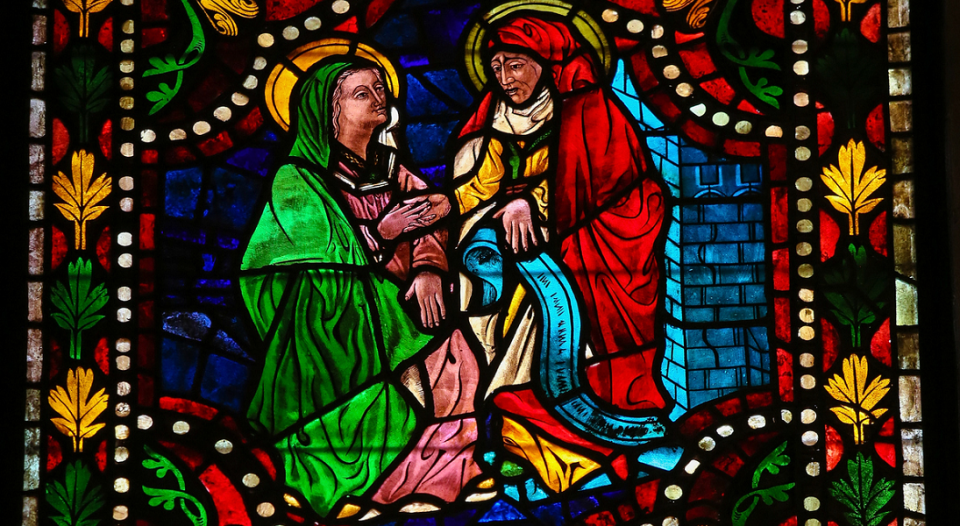Editor’s note: On Aug. 15, the church commemorates the Festival of Mary, Mother of Our Lord.
Any woman who can strap on boots and hike (with haste!) into the hill country (Luke 1:39) in the first weeks of pregnancy belongs in a Nike commercial rather than trapped in a perpetual posture of kneeling on barn straw.
The rumor mill must have been at full tilt. “Yes, Mom and Dad, I’m pregnant. And no, it isn’t Joseph. And well, no, it’s not anyone you know.”
The hills, the hike and the fresh air must have been a welcome respite from all the hushed whispers. I doubt Mary threw back the sash of her apartment window and announced her good news to the streets of Nazareth. “Hey, everybody! I’m the lucky girl! I’m pregnant with the Son of God!”
I suspect she was glad to get out of town.
Mary knocks on her relative’s door, a little cabin tucked way up in the hills. Certainly here she could find a sympathetic ear, for Elizabeth’s pregnancy is also rather strange. An angel first shared the news with Zechariah, an aging priest who was probably dreaming of the Clergy Retirement Home down by the shores of Lake Galilee.
“How can this be?” he inquires of Gabriel. “I’m an old man and my wife has lost most of her teeth.”
Mary stays with this old couple for three months (1:56), which would bring Elizabeth right up to her ninth month. I like to think that Mary helped deliver John the Baptist, who would soon roam the same hills and trails that brought Mary to this door. And I like to think that these two women had plenty of time to talk about their hopes and fears for their unborn children.
Elizabeth is pleased as punch to have company, but she’s also curious. “Blessed is the fruit of your womb, Mary, but why has this happened to me, that the mother of my Lord comes to me?” (1:42-43).
This is surely the earliest moment in the gospels that Jesus is called Lord, and it happens when he’s less than an inch long.
Mary responds to these accolades with “The Magnificat” (1:46-55). The words are so radical and unsettling that this song—put to music more than any other section of the Bible—was once banned in Brazil for fomenting political unrest. Whole groups of people trade places in her song.
This is surely the earliest moment in the gospels that Jesus is called Lord, and it happens when he’s less than an inch long.
Interestingly, Mary sings mostly in the past tense. These two women are sitting at a table sipping tea, comparing their unusual pregnancies. Jesus is hardly even a zygote and his mom stands up like Julie Andrews, belting out future promises about her son’s mighty work as if it’s already happened.
Mary is so sure that God will do these marvelous things that she belts them out as accomplished truth: “He has scattered the proud … he has brought down the powerful … he has filled the hungry with good things.”
I can’t imagine my mother singing the following words back in late summer of 1956 just after she became pregnant with her middle son: My son Frank has just become a Lutheran pastor! Nobody is that clairvoyant. But Mary sings exactly that way.
•••
These remarkable events, these two peculiar pregnancies, these two joyous women and the mute minister (1:20) who can only wave and scribble—all these old details serve to remind us that we, too, are heralds of an age that is yet to be but has already started in the gift of Jesus. So confident are we of Jesus’ lordship and the consummation of all things—the care of the poor and the scattering of the proud—that we can sing of such a coming future reality as if it has already occurred.
This is wonderful news—a mysterious blending of time and tense that summons us to sing our hearts out with Mary of old.
Nothing can derail this song.




